With Aussies creating one tonne of plastic every minute, we ask, are we rubbish at recycling?
THE effort required to sort out the reusable from rubbish means many are tempted to put recycling in the too-hard basket. But waste management crusaders say that attitude is a load of garbage.
VIC News
Don't miss out on the headlines from VIC News. Followed categories will be added to My News.
OUR family owns 1000 pets. Make that 1000 temperamental pets. They have strict specific dietary requirements and get antsy when it’s too bright. They even have their own special blankie to keep warm in winter. Bless.
What on earth have I dug myself into, you ask? Well, my pets are worms. And they’re worth it. Because those little creatures, in their wormy farm, do a lot of work for our family.
They’re Mother Nature’s natural recyclers, breaking down 4kg of kitchen scraps a week and converting them to rich, glorious fertiliser.
Between the worm army — and my self-imposed, year-long plastic-bag ban — I’m guilty of that irritating affliction called “environmental smugness”. You know, feeling virtuous about doing my bit and all.
PLASTIC BAG BAN TO BE EXTENDED
But that all came undone when I tagged along as parent helper on a school excursion to a tip. Well, not a tip exactly, but Banyule Council’s Rethink waste education centre.
The brave eight-year-olds and I waded deep into the humming, churning bowels of a material recovery facility (MRF, pronounced “murf”). It’s a giant factory that receives, separates and prepares recyclable materials such as paper, plastic, glass and aluminium.
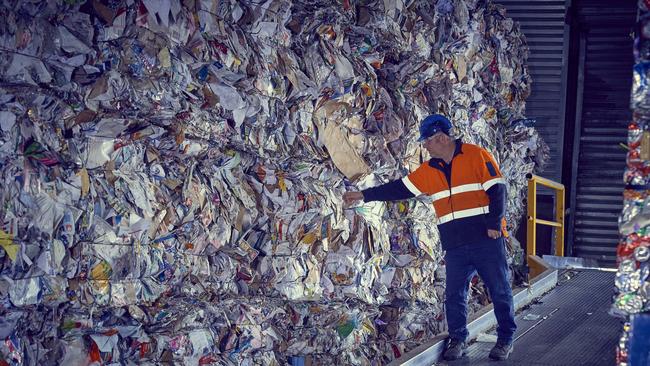
Some sorting is done by machines, some by hand. I watched, with a rising sense of guilt and nausea, as diligent workers sifted through tonne after tonne of waste on the re-sorting line; kilometres of rubbish rattled along the conveyor belt.
Have I been 100 per cent careful and considered when tossing items into the recycling bin? Embarrassingly, no.
And the tonnes of stuff that end up at a MRF are just the, er, tip of it.
“What’s depressing is how much of our plastic ends up in oceans, in landfill, unused and unrecycled. That’s what we need to address,” says Craig Reucassel, host of the ABC’s Logie-winning series War On Waste.
Reucassel, as unabashed and likeable as ever, is back for another three-part series tackling, among other things, our unhealthy reliance on plastic.
WHAT DOES THE PLASTIC BAG BAN MEAN?
“Have a guess how long it takes Australian households to create one tonne of plastic?” he shouts through a megaphone to stunned onlookers on a beach during the first episode.
The answer is one minute. One tonne of plastic. Every. Single. Minute.
“We have to reduce the amount of it — 80 per cent of this won’t be recycled. It’s overwhelming and it’s tragic,” Reucassel says.
Some claim our waste issue is at crisis point following China’s recycling ban; not a ban per se but strict new rules that amount to one.
China will now only accept very high-quality material for recycling, which rules out most of what we collect in Australia.
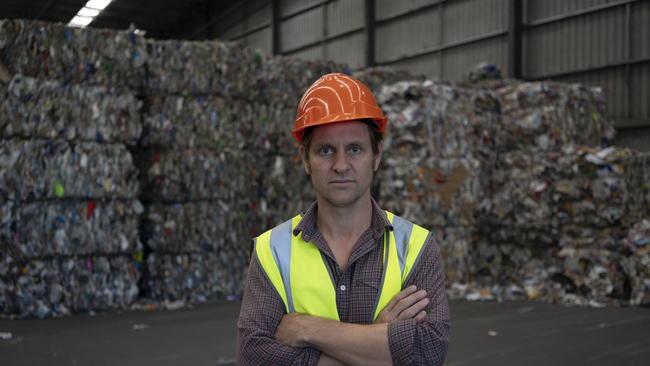
“The China situation has made people go, ‘Hang on, we have to do something about our waste’.” Reucassel says.
The good news is, collectively, we can do something by following a few “Rs”.
RETHINK, REFUSE
BANYULE Council is striving for zero waste within the next four years. Mayor Mark Di Pasquale says the huge volume of rubbish the community is generating needs to stop.
“It’s essential that we change our collective mindset and behaviours,” he says. “Each of us must make better individual choices.
“Getting the right thing in the right bin is important but equally important is not using plastic packaging and non-sustainable materials in the first place.”
Which brings us to the first steps in waste management — those that need to come before we righteously chuck stuff into the bin with the yellow lid:
■ Rethink our shopping choices; are they sustainable? Do they come with reusable containers and recyclable packaging materials?
■ Refuse to buy items that can’t be recycled or come wrapped in unnecessary and excessive packaging. Have I diligently checked the packaging credentials of every item while tearing through the supermarket aisles, kid in tow, on my twice-weekly shop? Nope.
Reucassel concedes it’s frustrating because so many items are packaged up and often there is no alternative.
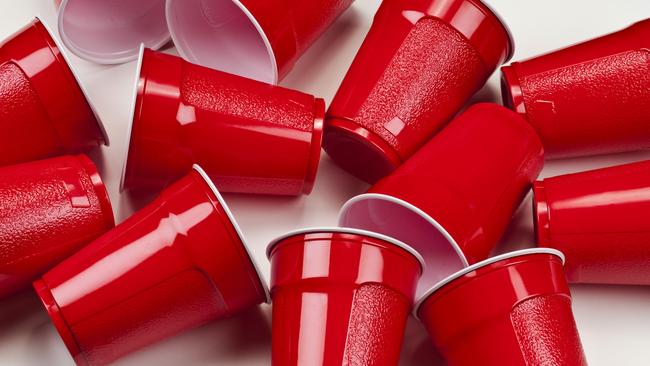
“Some plastic has a purpose; it prevents food waste,” he says. “I don’t walk through a supermarket and say we could get rid of everything straight away. But there is definitely a lot of plastic waste; it’s there for the convenience of the supermarket and shoppers.”
Like that pre-peeled mandarin in plastic that made its way to US supermarket shelves?
“That’s part of ultra-convenience and it’s ridiculous,” Reucassel says. “If you need your mandarin peeled and repackaged, calm down. If your life is that busy, I don’t think you’re ready for the ‘craziness’ of a peeled mandarin.”
There’s that trademark Reucassel humour. It packs a punch because it comes with a palpable message: look for products with the least amount of packaging to get the job done.
Which leads us to that hot potato: plastic bag ban rage.
Woolworths was forced to modify its plan to charge 15c for thicker, reusable bags (instead of free, single-use plastic bags) after a customer backlash.
The supermarket giant handed out free reusable plastic bags for 10 days so shoppers could adjust to the new policy.
Reucassel, who was pleasantly shocked Woolworths and Coles agreed to the ban in the first place, says state governments should be copping the heat.
“Victoria and New South Wales have not brought in legislation about plastic bags, leaving it up businesses to go out on their own,” he says. “Now they’re facing all the punters’ blame for it. I can’t believe we have got to a point where our governments are slower to act than businesses.
“Before an outright ban, as a first step we should have to pay for plastic bags. That will slowly change people’s habits so they get used to bringing their own bags.
“Then governments can bring in laws to ban them entirely. You want a plastic bag? You have to pay for it.”
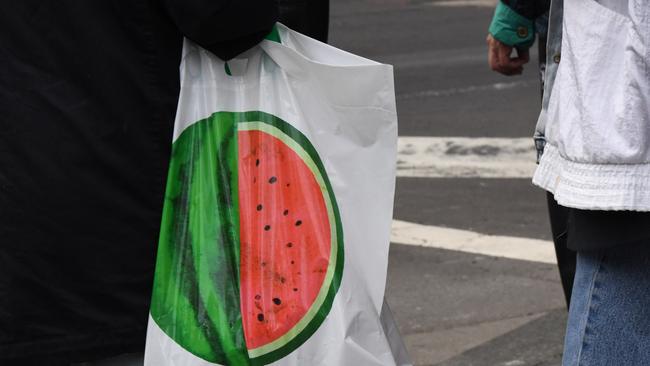
Jon Dee, environmental campaigner and founder of non-profit organisation DoSomething, agrees.
“The supermarkets are training us to break that plastic bag habit,” Dee says. “Chemists, corner stores, hardware and department stores are not affected by the plastic bag ban.
“Big department stores also need to stop giving away those thick plastic bags and move towards paper bags that have come from sustainable forests. They are cheaper than they used to be, so there is no excuse.
“Either way, it’s important when you go to non-supermarket outlets that you take your own bag.”
RECYCLE BETTER
OK, confession time. I thought “contaminated” recycling referred to dirty recycling. You know, not rinsing out the Uber Eats containers before chucking them in the recycling. The truth is far more damaging, says Dee.
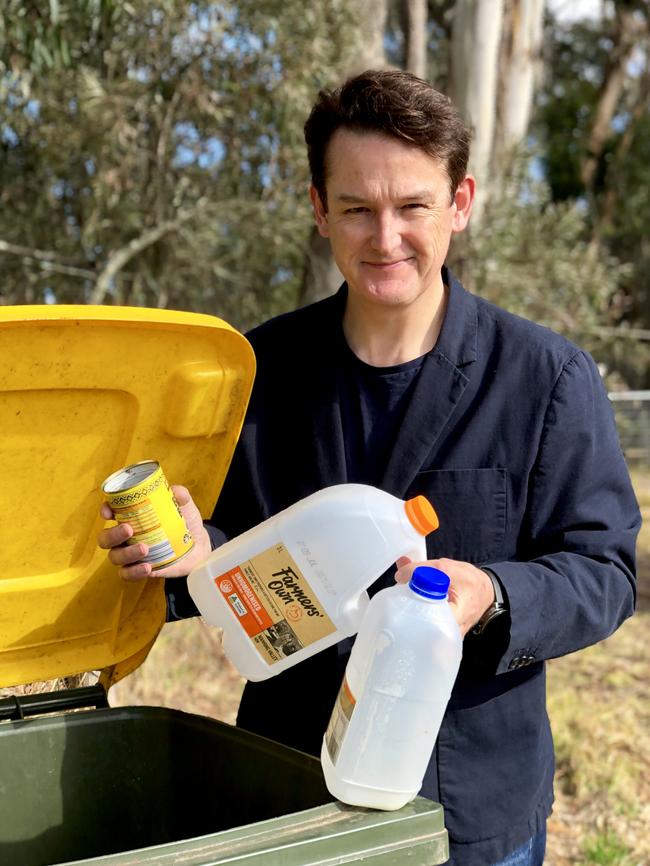
“Australians like to think they are great recyclers, but far too often we put rubbish in the recycling bin that should go out with the garbage,” he says.
“This creates huge problems. If, for example, you put a cracked, ovenproof glass cooking dish in the recycling, even just a tiny bit can stop a whole tonne of glass from being recycled, because it melts at a different temperature to glass bottles.
“In fact, just 15 grams of ovenproof glass will render a whole tonne of normal glass bottles unrecyclable — it’s just too contaminated.
“Also many people unwittingly put their recyclables in plastic bags, thinking they’re doing the right thing by keeping it nice and neat. The problem is when that bag arrives at the MRF, the recyclables are not loose and can’t be separated by the equipment.”
Reucassel reckons there are two ways to tackle contamination.
First, there needs to be a national approach to recycling. At the moment every council has different rules. If there’s a national education campaign, everyone will be on the same page.
Second, clearer packaging is needed, telling consumers what goes into what bin. War On Waste targets meat trays, which come with a perplexing array of stamps. What do they all mean?
“In typical Australian style, labelling is all voluntary. There is too much complexity. There is still packaging that just bamboozles me,” the waste warrior says.
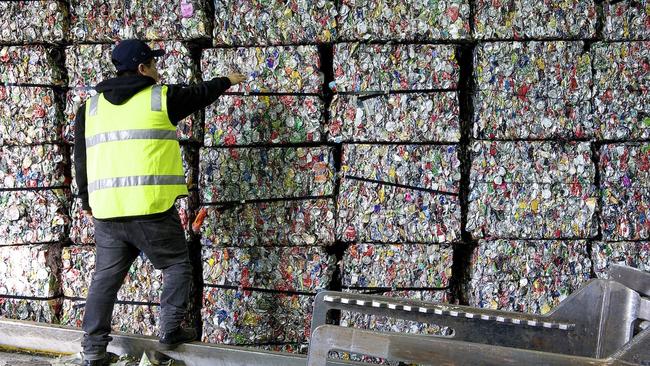
REUSE
DEE says the current system, where we make things, use them up, then throw them away, has to go.
“What we’ve got to look at in Australia is developing our own recycling systems where we take material that’s collected by the recycling companies and recycle it here in Australia,” he says.
“It’s called a circular economy, where materials are designed to be used again and again and again.
“Take our two and three-litre milk containers; they’re all made from virgin plastic. Yet we already have the technology to enable a recycle content of up to 30 per cent of old milk cartons being used in new ones. That would enable us to recycle 200 million milk cartons a year and stop 10,000 tonnes ending up in Australia’s landfill.”
Many people claim they do reuse plastic shopping bags as bin liners. Is that acceptable — or indeed, an excuse? No, says Dee, who hasn’t used bin liners for 25 years.
“If you have food waste, which is the cause of stinky bins, that should be put into a compost bin or worm farm,” he says. “Recyclables go into their bin. Everything else, which should be a small amount, goes in your regular bin.
“Do what your grandparents did: get a newspaper, lay it flat on the kitchen bench, put your leftover rubbish in the middle of it, wrap it like fish and chips, then put it in the garbage bin. Every six weeks, you’ll have to give your bin a rinse out.”
What about doggie-do bags?
“We have a labrador that could poo for Australia in the dog Olympics and we use plastic bread bags," Dee says. “They’re thicker than plastic shopping bags and they’re longer, so they are easier to tie a knot.
“If you don’t eat enough bread, get your dogless friends or neighbours to give you their bags.”
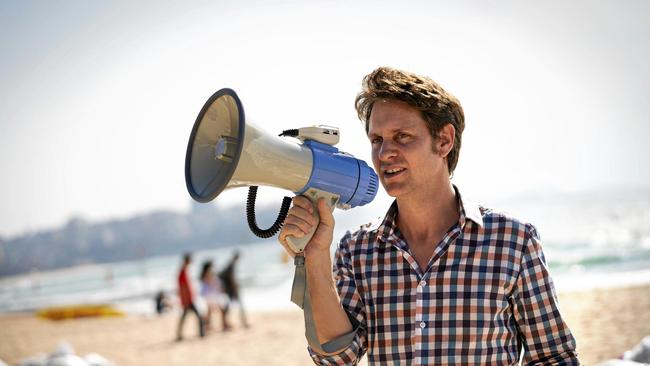
REPAIR
THE concept of remodelling, remoulding, repainting, restoring or rebuilding anything is anathema in this throwaway world; it’s easier and cheaper to re-buy than to repair something past its used-by-date.
Our fridge packed it in. The electrician told us a repair would entail a $250 callout fee, $300 in parts — and a week-long wait. A week with no fridge?
But a new refrigerator could be delivered that day for $899. And the delivery guys would wheel away the old model to its grave.
I’m ashamed to say it was a no-brainer. Out with the old and in with the new.
This got me thinking about the curse of built-in obsolescence, where products are designed with an artificially limited useful life. Take technology that evolves so quickly gadgets go stale in months, rather than years.
Have you checked your third drawer in the kitchen lately? Mine is writhing with tangled, and redundant, chargers, earphones, a pre-smartphone digital camera and an iPod. How retro.
The unbelievably low cost of manufacturing means it’s cheaper to throw out and replace things rather than re-using them.
“It is ridiculous,” Reucassel says. “You get a new printer for 90 bucks and to fix it will cost twice that. We need to put pressure on companies to take more responsibility for their products, to design them so they can be repaired.
“And somehow we have to factor in the cost of waste into the cost of the product so there is no incentive to just chuck out stuff.
“People say they find the topic depressing. I find it a mixture of depressing and positive because there are things you can do.”
Feeding 1000 hungry worms is just the start.
WAR ON WASTE: THE BATTLE CONTINUES STARTS ON ABC TV ON TUESDAY AT 8.30PM
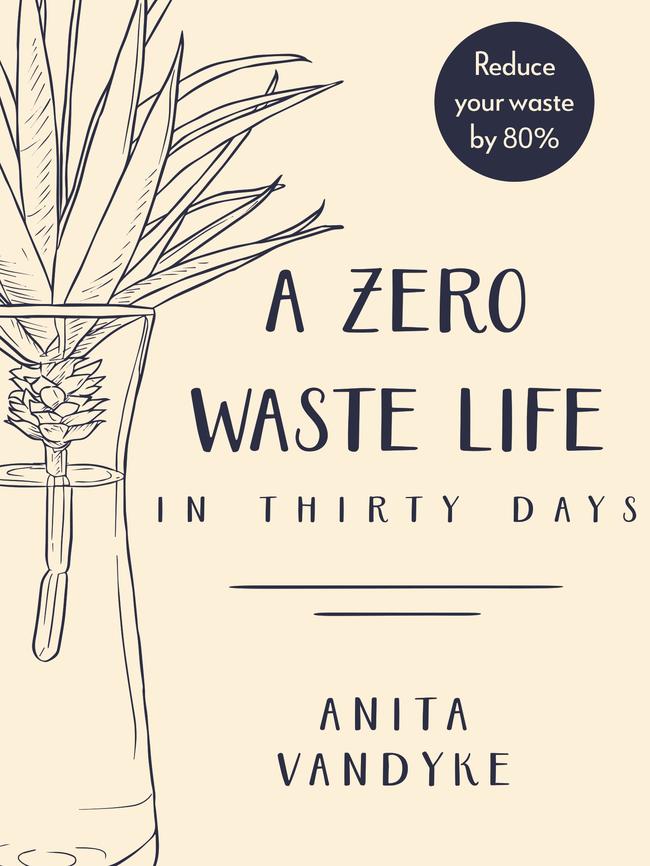
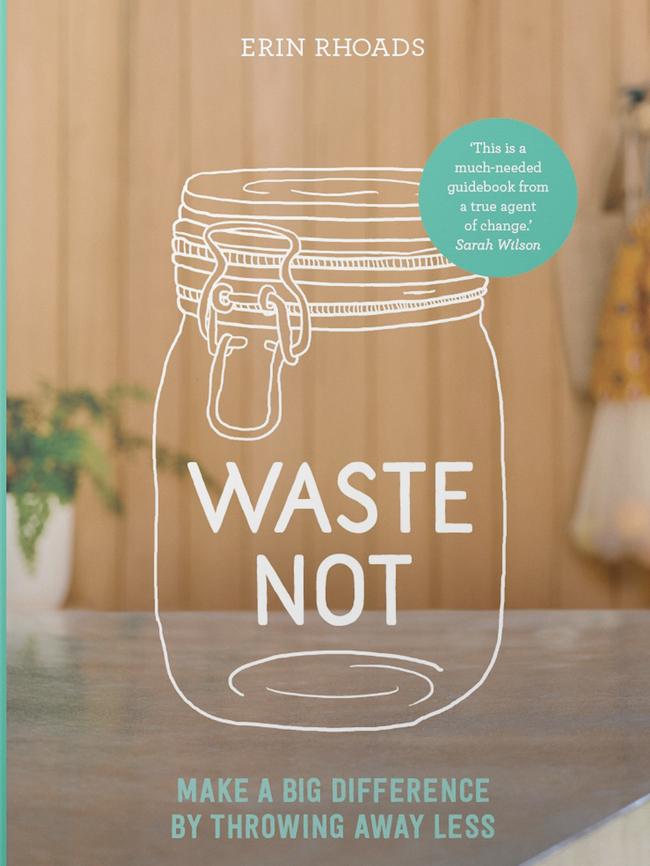
WASTE NOT, WANT NOT
THERE are people who manage to live plastic-free and produce zero waste. It’s astounding and impressive, albeit a little daunting.
But even small steps can make a big difference. Two new books look at how we can tweak our lives to reduce waste.
“Most of these tips aren’t radical. Many are similar to what our great-grandparents would’ve done,” says Erin Rhoads, eco-lifestyle commentator and author of Waste Not.
Her advice includes: cooking with scraps as the average household bin is made up of 40 per cent food waste; how one bar of gentle olive oil soap can eliminate shower gels, face wash, liquid hand wash, shaving gel and shampoo — that’s five plastic bottles avoided through one bar of soap; and using old magazines, pages from an atlas or children’s artwork to wrap gifts.
Taking small but meaningful steps towards a gentler footprint on the planet is also the focus of Anita Vandyke’s book, A Zero Waste Life, a practical guide to reducing your waste in 30 days.
Vandyke suggests, among other things, saying no to disposable items and arming yourself at all times with a zero waste kit containing a foldable, reusable bag, a stainless steel drink bottle and straw and a reusable coffee cup.
“There is a stereotyped image of the quintessential environmentalist — a left-wing hippy who doesn’t wear deodorant and lives off-the-grid. But I want to introduce you to a new kind of environmentalist — the ‘everyday activist’,” Vandyke says.
WASTE NOT, BY ERIN RHOADS, (HARDIE GRANT BOOKS, RRP $30)
A ZERO WASTE LIFE, BY ANITA VANDYKE, (VINTAGE BOOKS, RRP $20)


